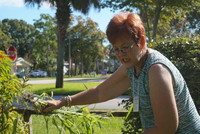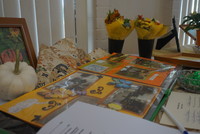







Water conservation issues facing the local community was the focus of the Ribault Garden Club’s annual “Coffee and Program” breakfast meeting held Sept. 22 in Jacksonville Beach.
“This time of year is always exciting because it’s the first group meeting of the year,” said Eileen Zebroski, a youth garden coordinator and club member. “It’s a time of catching up because many of us are seeing one another for the first time in a year. But it’s also important because we’ll be discussing things that affect all of us.”
The meeting continued the club’s tradition of discussing a subject of environmental studies with special guest Deirdre Irwin, water conservation coordinator of St. Johns River Water Management District (SJRWMD).
Irwin urged the members to think of what they can do in the present to stave off overuse.
Irwin said Jacksonville's population is expected to grow significantly.
“We don’t want to wait until it’s too late," she said. "It’s better to know 15 years early on why conservation is important right now.”
Irwin offered several tips, suggestions and resources for local residents to encourage conservation habits while also recognizing some of the challenges of water conservation.
“Some people underestimate just how difficult it can be to save water because the change isn’t immediately beneficial to them,” she said. “Saving water can be costly. Effective water conservation sometimes requires buying new appliances and changing our own behavior – but it’s important because we’re relying heavily on conservation.”
Invest in “sense” – Irwin suggested investing in EPA WaterSense labeled fixtures to aid conservation in the home. Products with the label meet the EPA’s specifications for efficiency and are backed by testing and certification.
Irrigate less – Irrigation systems are among the biggest uses of water in St. Johns County. Irwin addressed a frequently overlooked aspect of water conservation by focusing on the ways outdoor usage is costing residents.
“It just doesn’t make sense to irrigate every single day,” she said, suggesting that during the dormant season irrigation could be reduced to as little as once per week. “Even with advanced irrigation systems, it’s possible to overuse water.”
To remedy this problem, Irwin recommended more efficient means of maintaining gardens and lawns with micro-irrigation, the practice of watering only the areas that need it while avoiding things (such as mulch) that don’t.
Water-wise landscaping – Irwin also noted a major source of inefficient irrigation practices: impractical landscaping. Site-appropriate landscaping choices such as planting vegetation native to the area, increasing the areas of shade in large yards to avoid overwatering plants and reducing areas of irrigated turf were a few tips presented. “Groundcovers” such as African Lily, Holly Fern and Mondo Grass fare well in shady areas, while trees like Crapemyrtle and Shumard Oaks provide shade without looking “out of place” in yards.
Form new habits – Irwin encouraged behavioral changes for more efficient water usage.
Things such as turning the faucet off when brushing teeth, running dishwashers only when they’re full, checking and fixing leaks, setting clothes washers for the appropriate load size and filling bathtubs to one-third are small yet immediate ways to reduce individual water usage.
“Be aware of overuse, of our resources and their limits and how simple changes can make a big difference,” she said. “I truly believe that if everyone does their part, we can make a difference.”